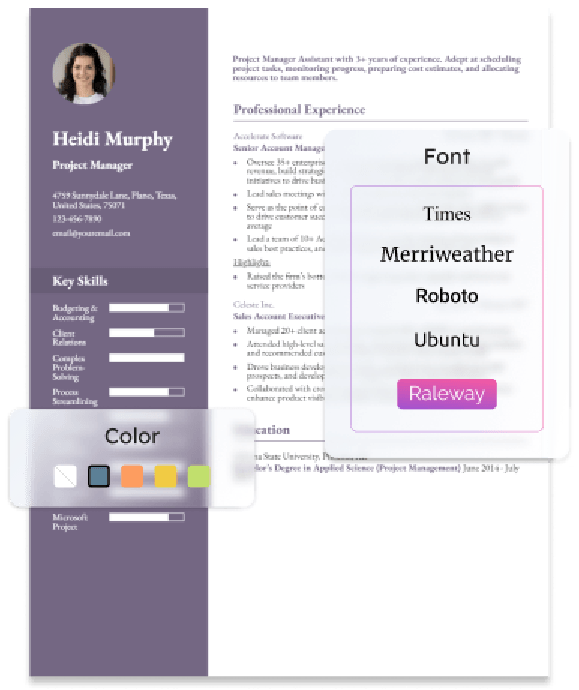An attention-grabbing nursing resume will showcase your relevant certifications, experience, and accomplishments. To advance your career, use specific information about the type of nursing work you’ve done before, including data such as patient load, efficiency and satisfaction rates, and number of team members you supervised, if applicable. Focus on your skills and tangible examples from your career to illustrate your unique background within the health care industry.
“Nursing resumes need to do more than list credentials — they should demonstrate compassion, adaptability, and the ability to thrive in high-pressure environments. Show how you've made a difference in patient outcomes and team care delivery.”
— Carolyn Kleiman, Resume and Career Advisor
Most Popular Nurse Resumes
Nurse Entry-Level Resume
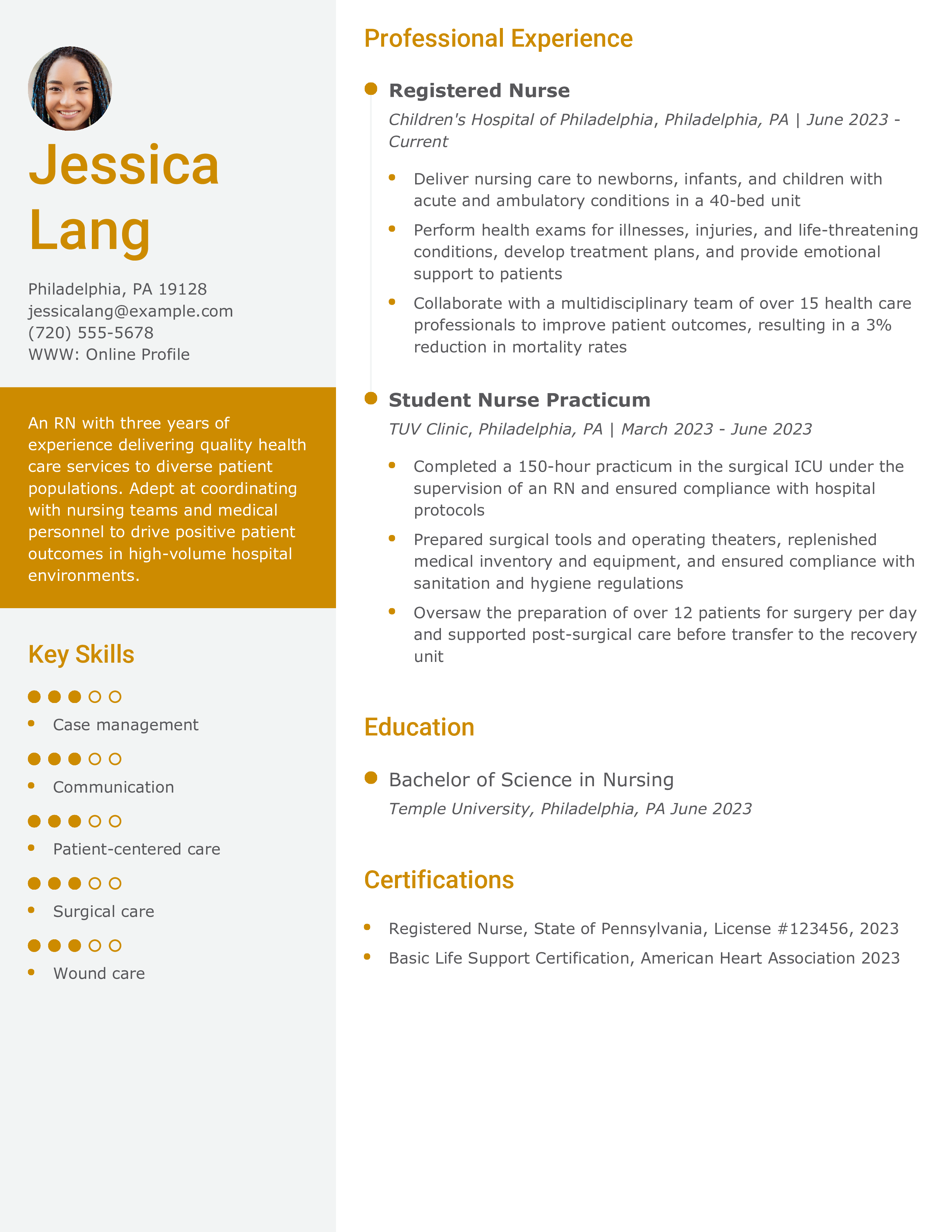
Why this entry-level RN resume example is strong:
This resume is strong because it demonstrates the candidate’s ability to deliver quality care in high-pressure hospital environments while also contributing to reducing mortality rates by 3%. It highlights a hands-on practicum experience in a surgical ICU, showing the candidate’s early exposure to complex care settings. Additionally, certifications such as Basic Life Support and state licensure strengthen the qualifications.
Nurse Mid-Level Resume
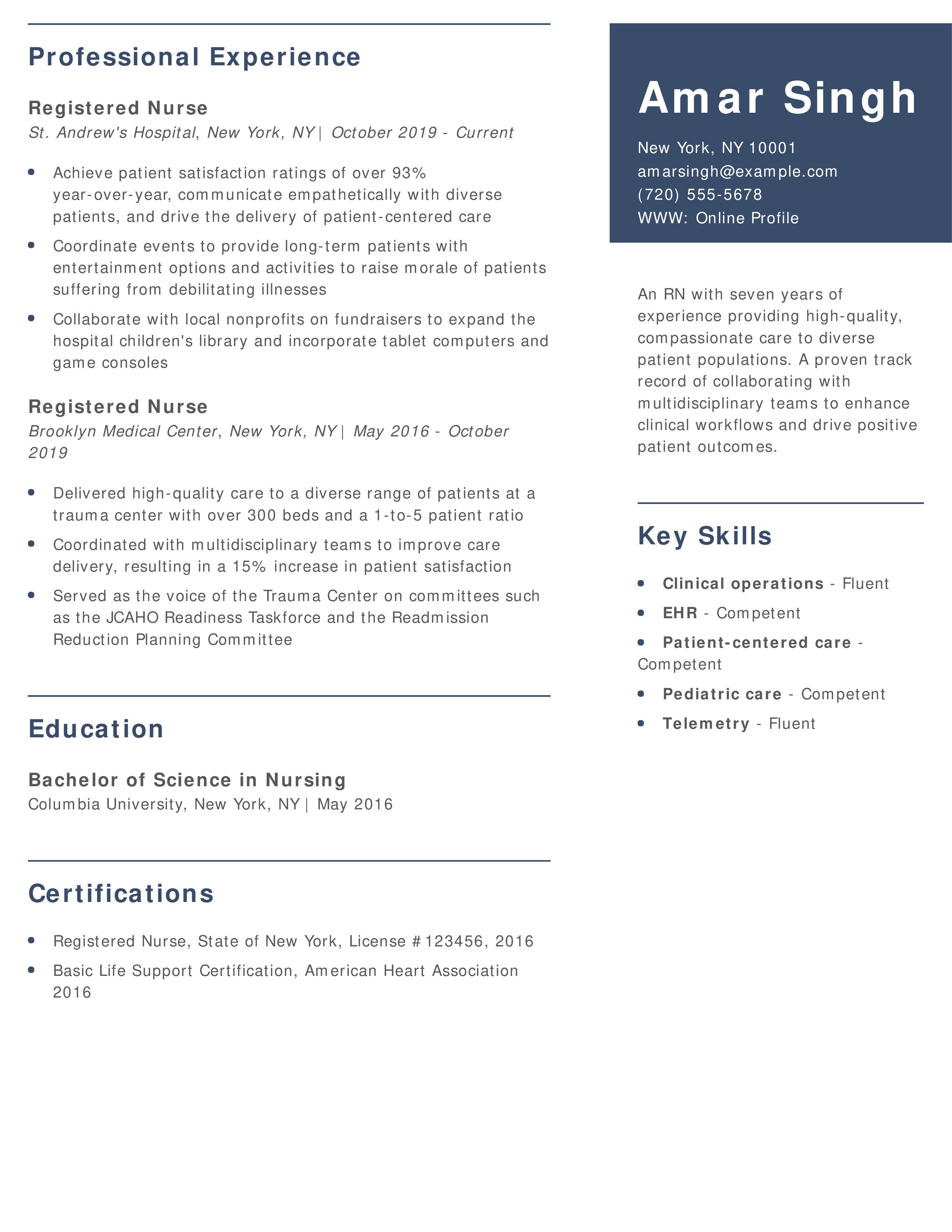
Why this mid-career RN resume example is strong:
This resume shines due to the candidate’s consistent delivery of patient satisfaction rates above 93%, showcasing their ability to build rapport with patients and improve care quality. It also highlights leadership capabilities, such as coordinating patient activities to boost morale, and collaboration with nonprofits for hospital improvements. The experience in trauma centers and committee involvement further demonstrate the candidate’s ability to contribute to strategic initiatives within hospitals.
Nurse Senior-Level Resume
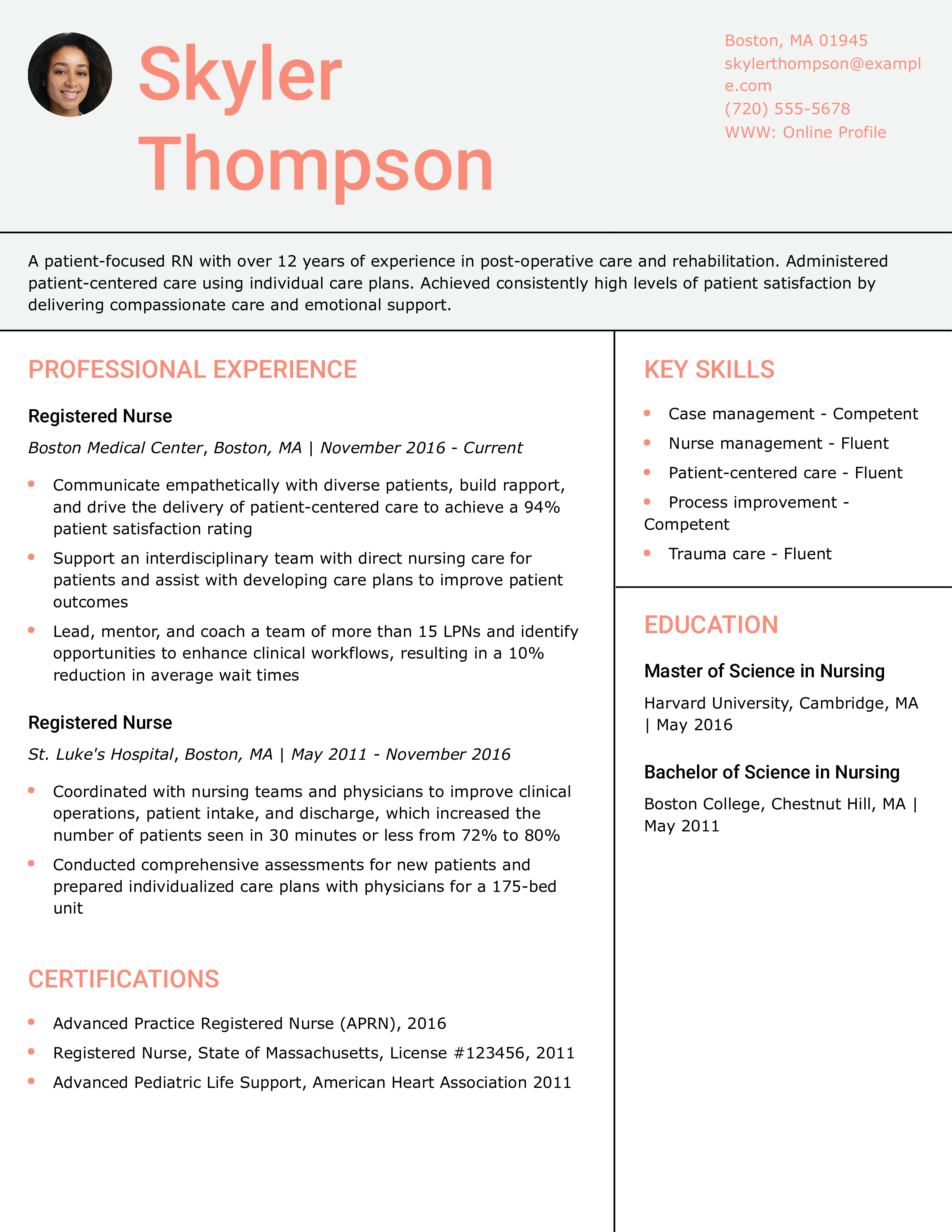
Why this senior-level RN resume example is strong:
This resume stands out due to the candidate’s leadership in managing a team of over 15 LPNs and implementing clinical workflow improvements, which led to a 10% reduction in wait times. The ability to communicate empathetically with patients while maintaining a 94% satisfaction rate is a key strength. The extensive experience in post-operative care and trauma, combined with advanced certifications like APRN, positions this candidate as an expert in their field.
ICU Nurse Resume
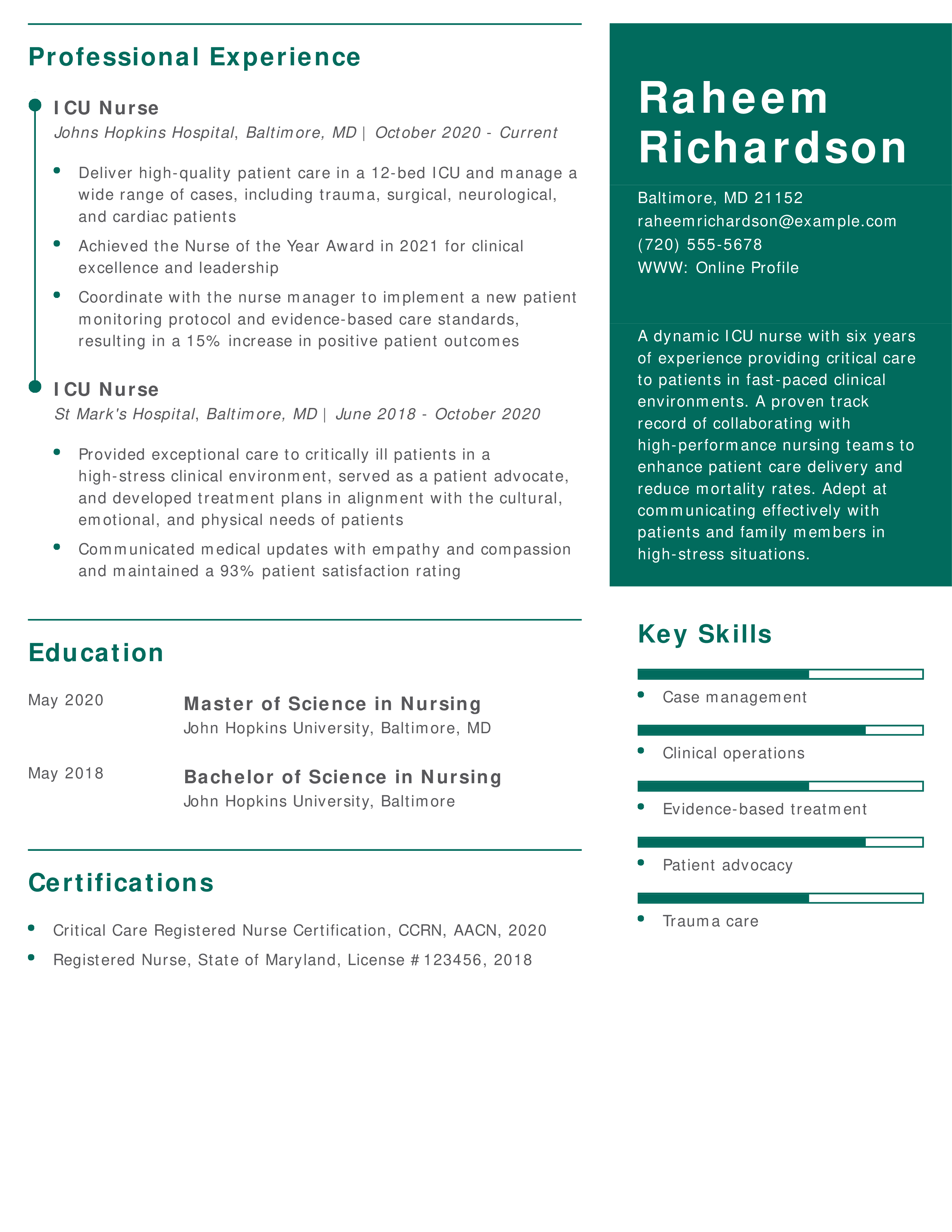
Why this ICU nurse resume example is strong:
This resume effectively highlights the candidate’s ability to thrive in high-stress environments, providing exceptional care to trauma, surgical, and cardiac patients. Earning a Nurse of the Year Award emphasizes their clinical excellence and leadership qualities. The focus on implementing evidence-based care standards that improved patient outcomes by 15% demonstrates both initiative and impact, making this a strong resume for ICU nursing roles.
Critical Care Nurse Resume
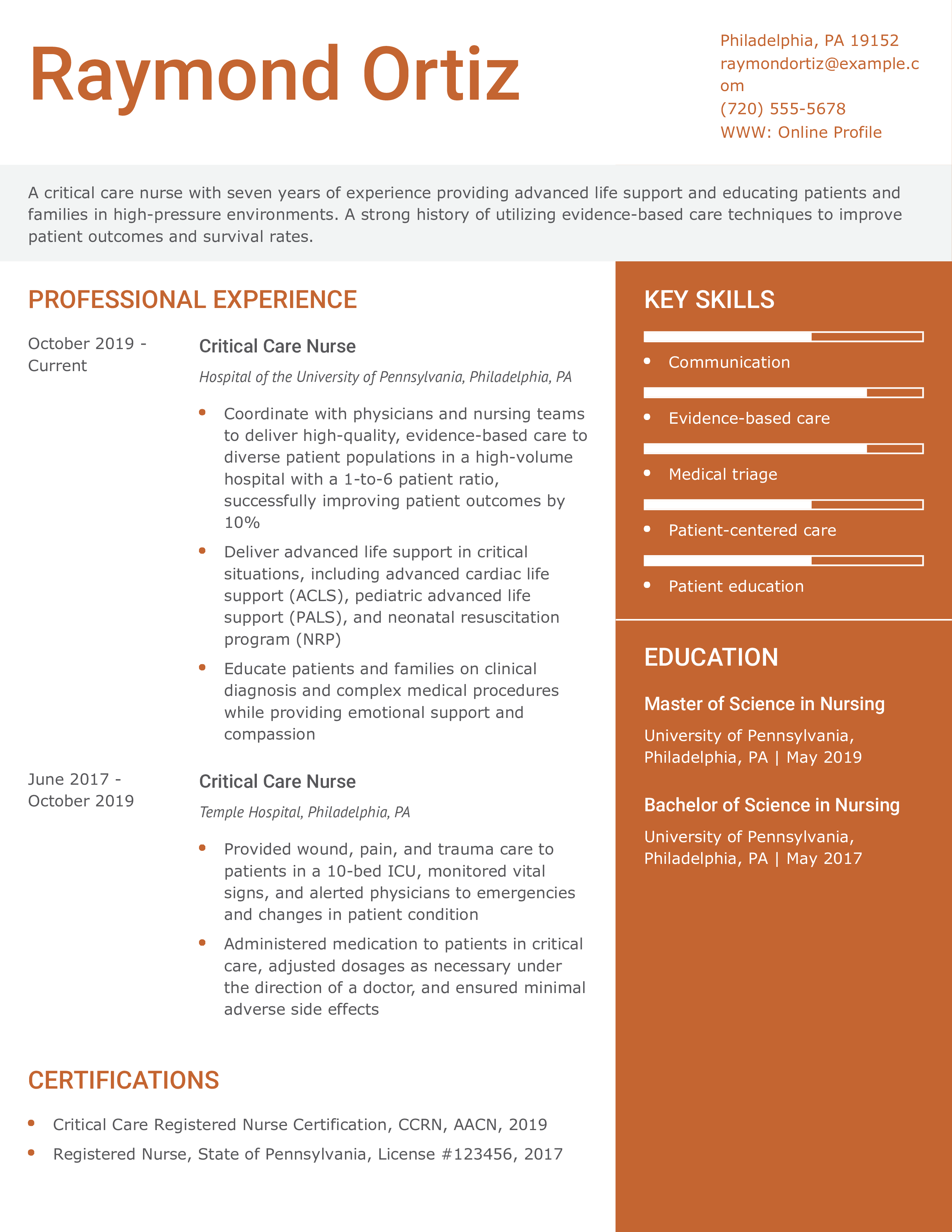
Why this critical care nurse resume example is strong:
This resume showcases the candidate’s experience in administering advanced life support and working with critically ill patients in high-pressure environments. The quantifiable impact of improving patient outcomes by 10% and maintaining a high patient satisfaction rate strengthens their profile. The certifications in advanced life support and the ability to provide comprehensive patient education add to the depth of their qualifications.
School Nurse Resume
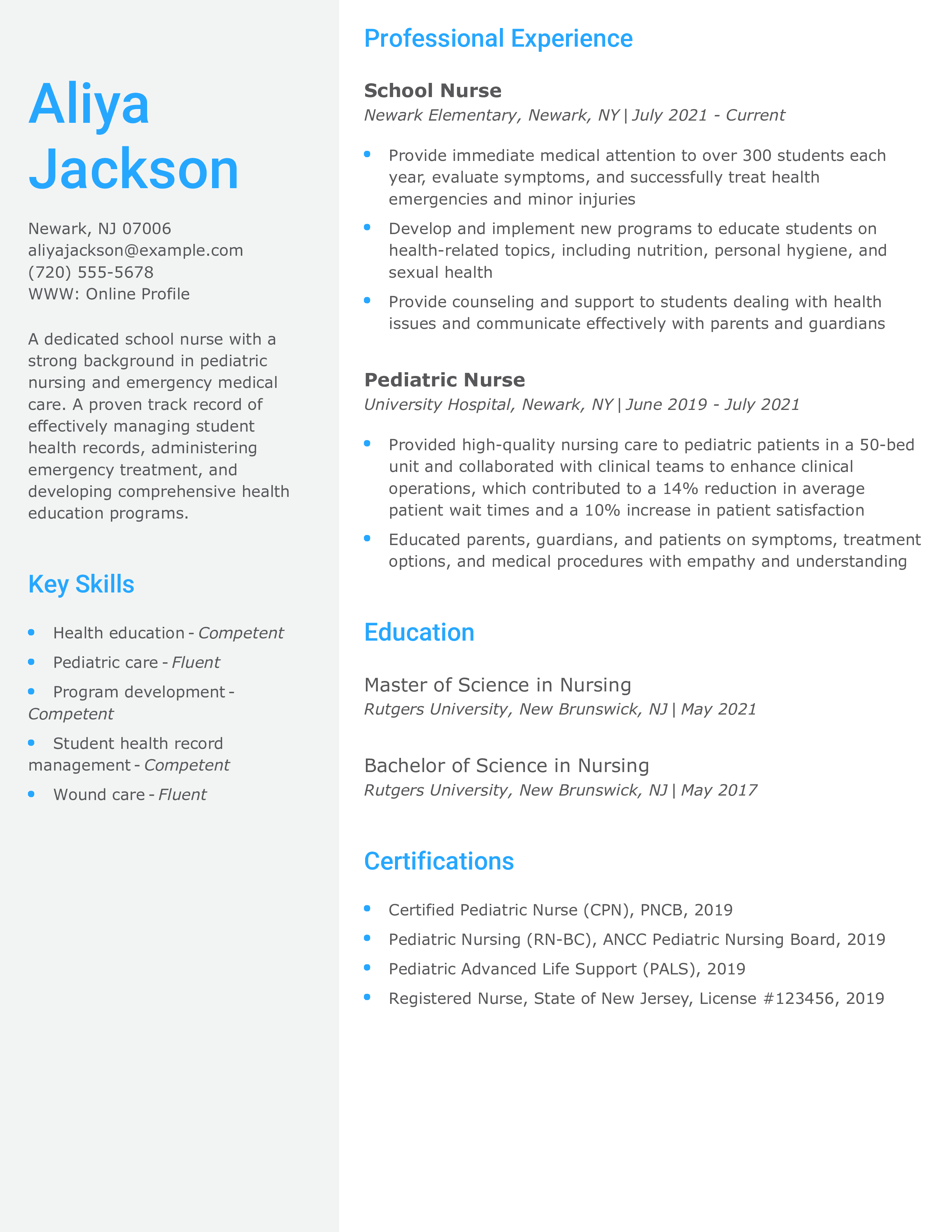
Why this school nurse resume example is strong:
This resume demonstrates the candidate’s versatility in pediatric nursing and their ability to develop impactful health education programs. The experience of treating over 300 students per year and handling both minor injuries and health emergencies showcases their capacity to manage a broad range of health scenarios. The combination of pediatric certifications and the development of student health programs sets this candidate apart as a proactive and skilled school nurse.
Nurse Manager Resume
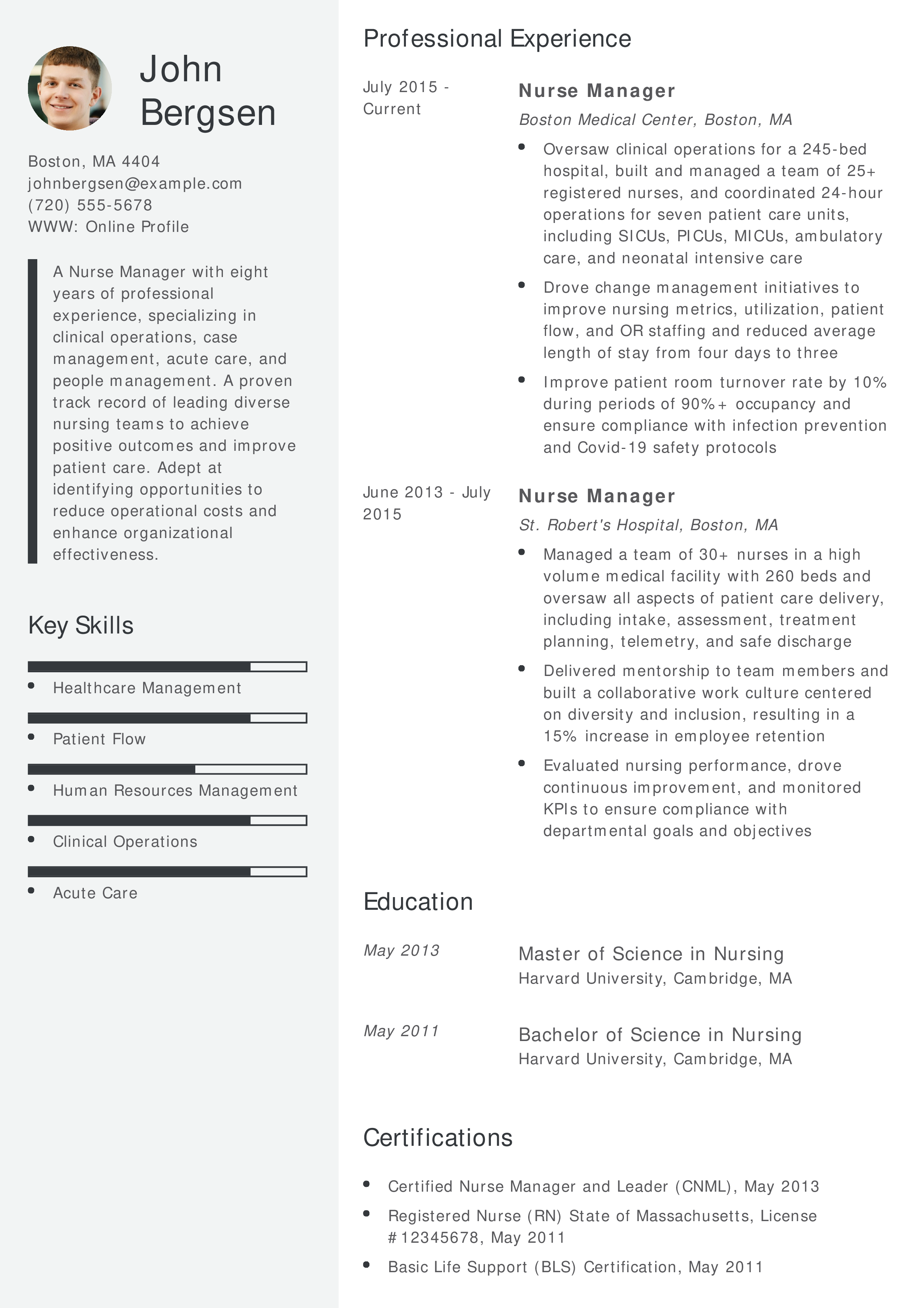
Medical Surgical Nurse Resume
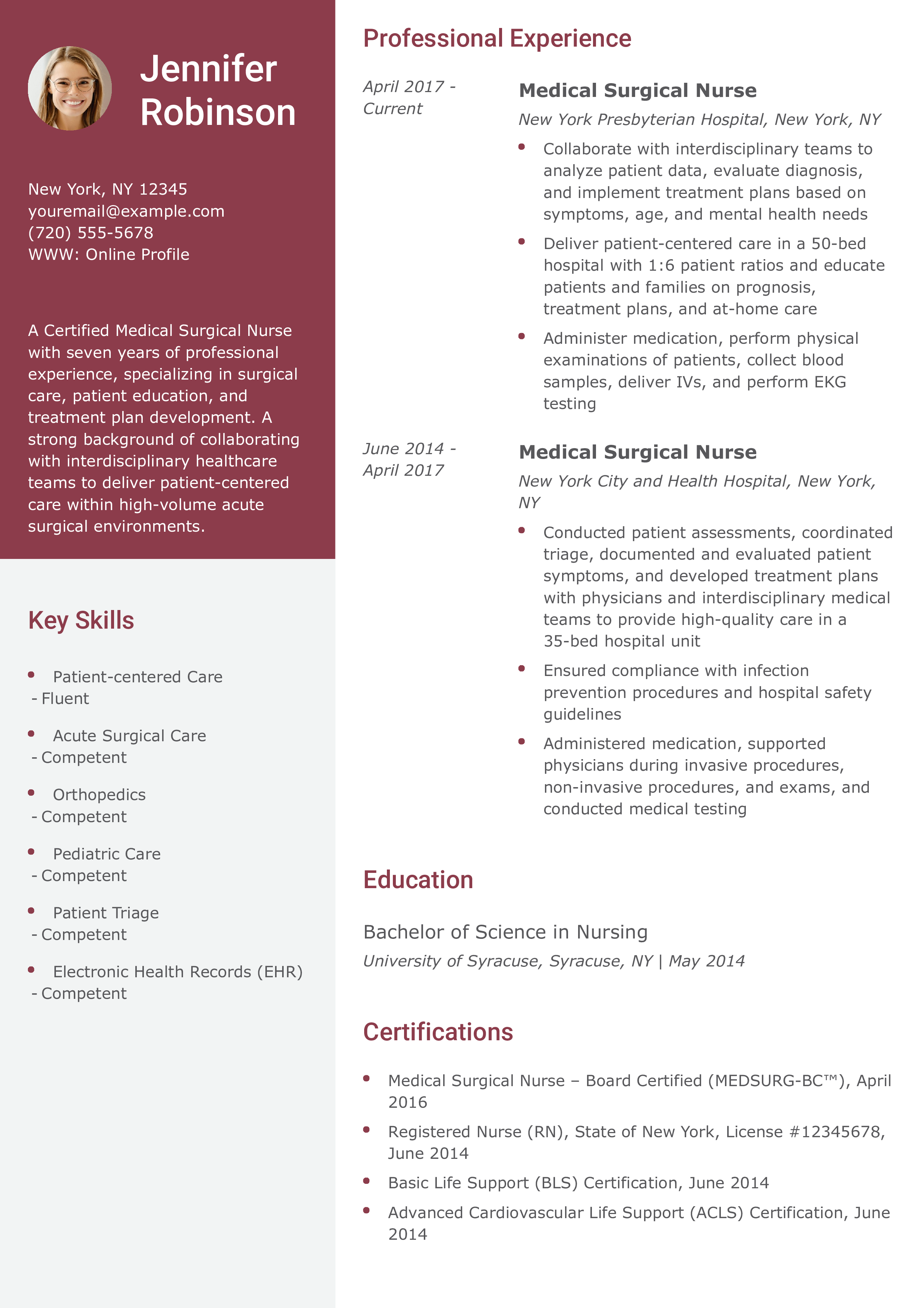
Emergency Room Nurse Resume
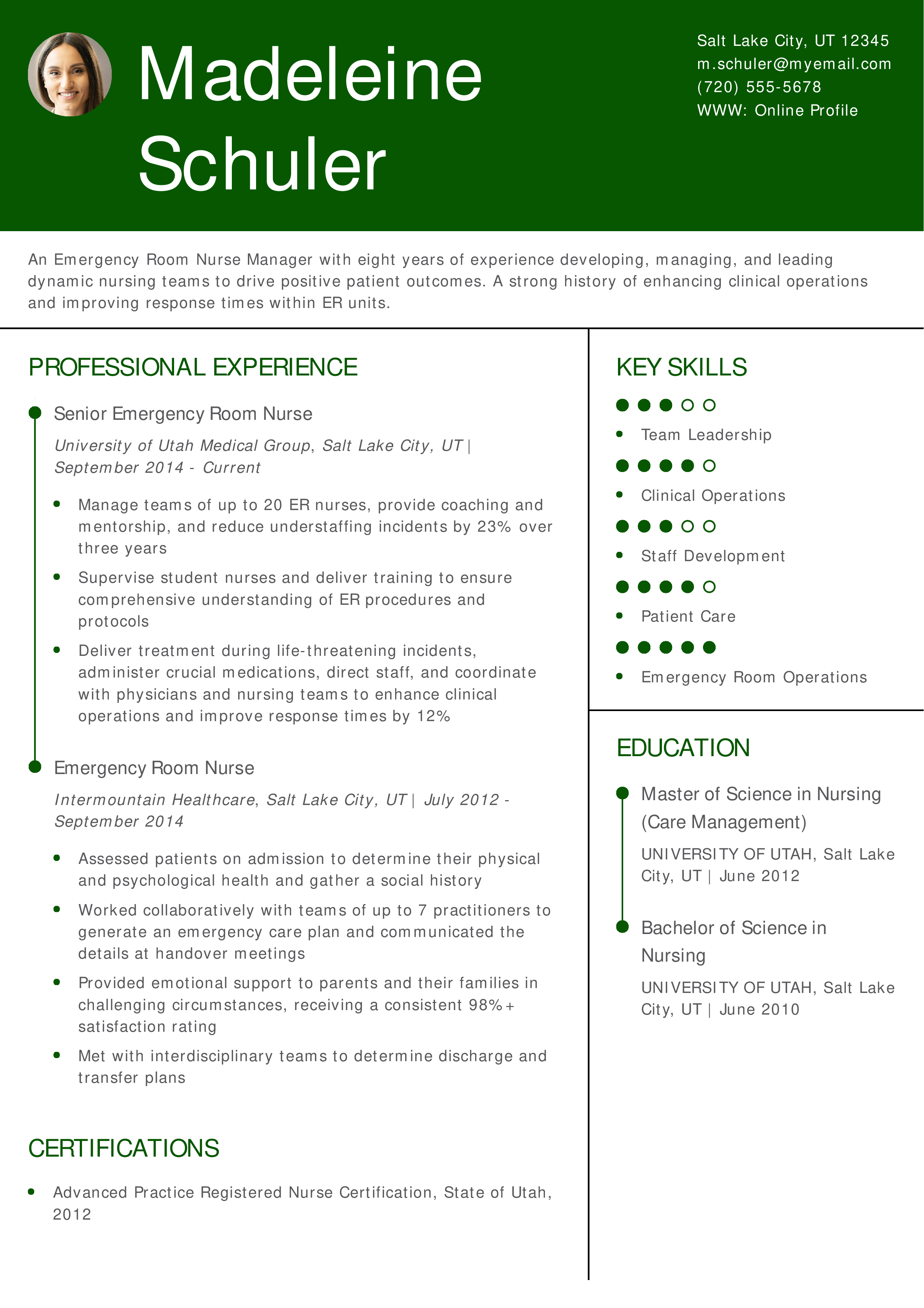
Registered Nurse Resume
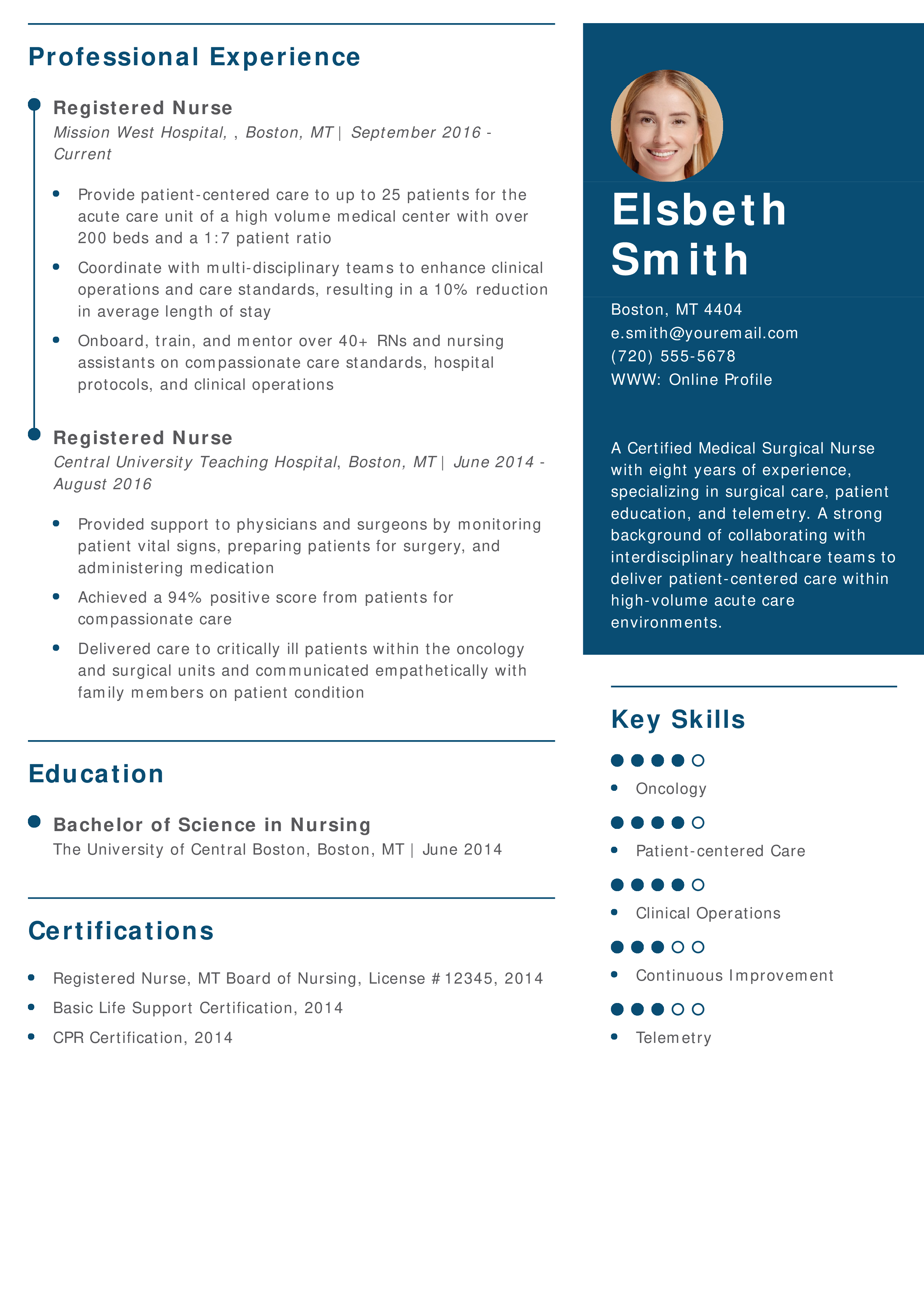
Home Health Nurse Resume
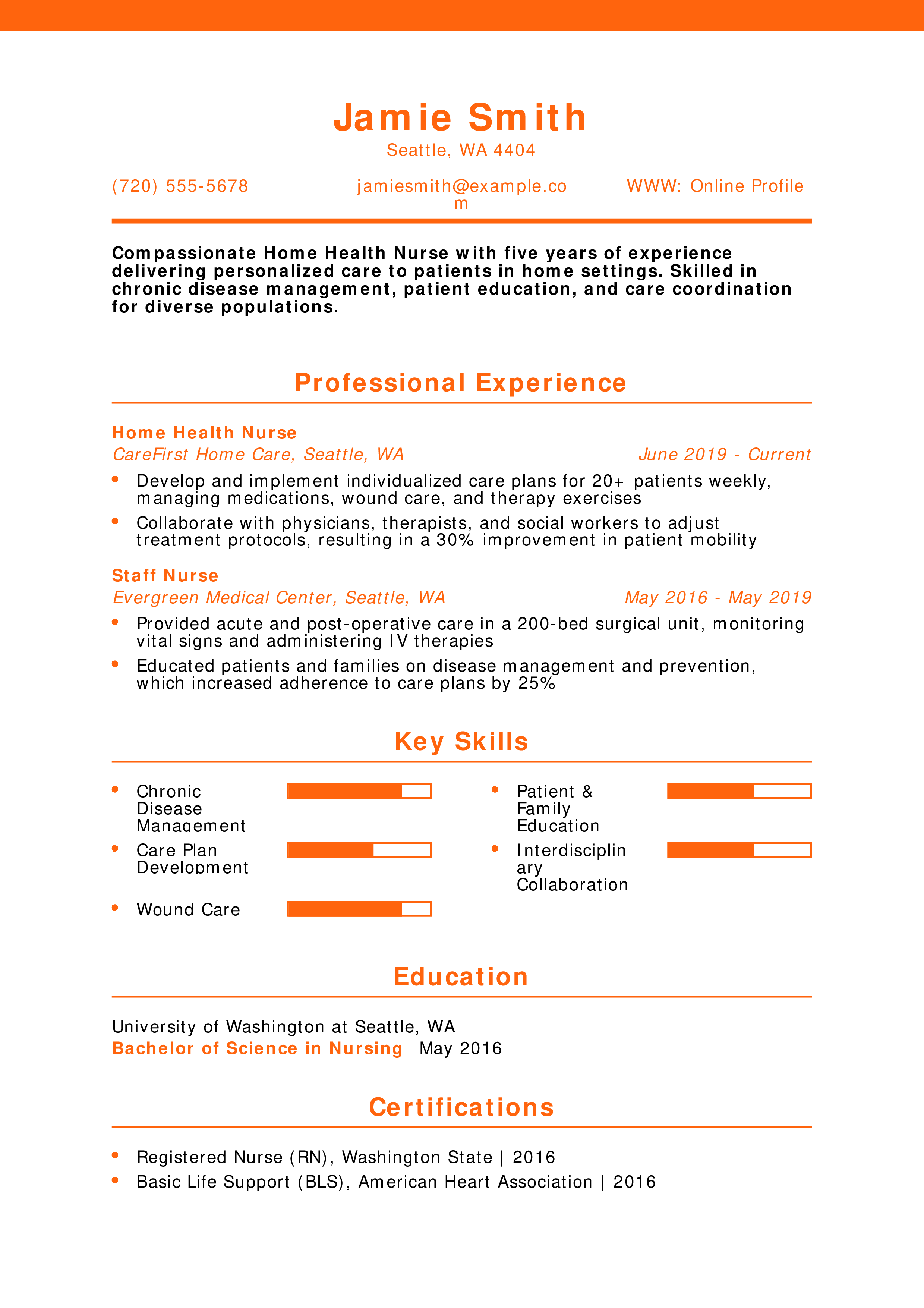
Why This Resume Is a Great Example:
Jamie’s resume highlights her ability to deliver high-quality home care through quantified outcomes, like a 30% improvement in patient mobility. It also showcases strong teamwork with other health professionals to optimize patient treatment.
Key Tip
Emphasize specific patient outcomes to illustrate the impact of your care. For advice on structuring your nursing achievements, see Best Resume Formats.
PACU Nurse Resume
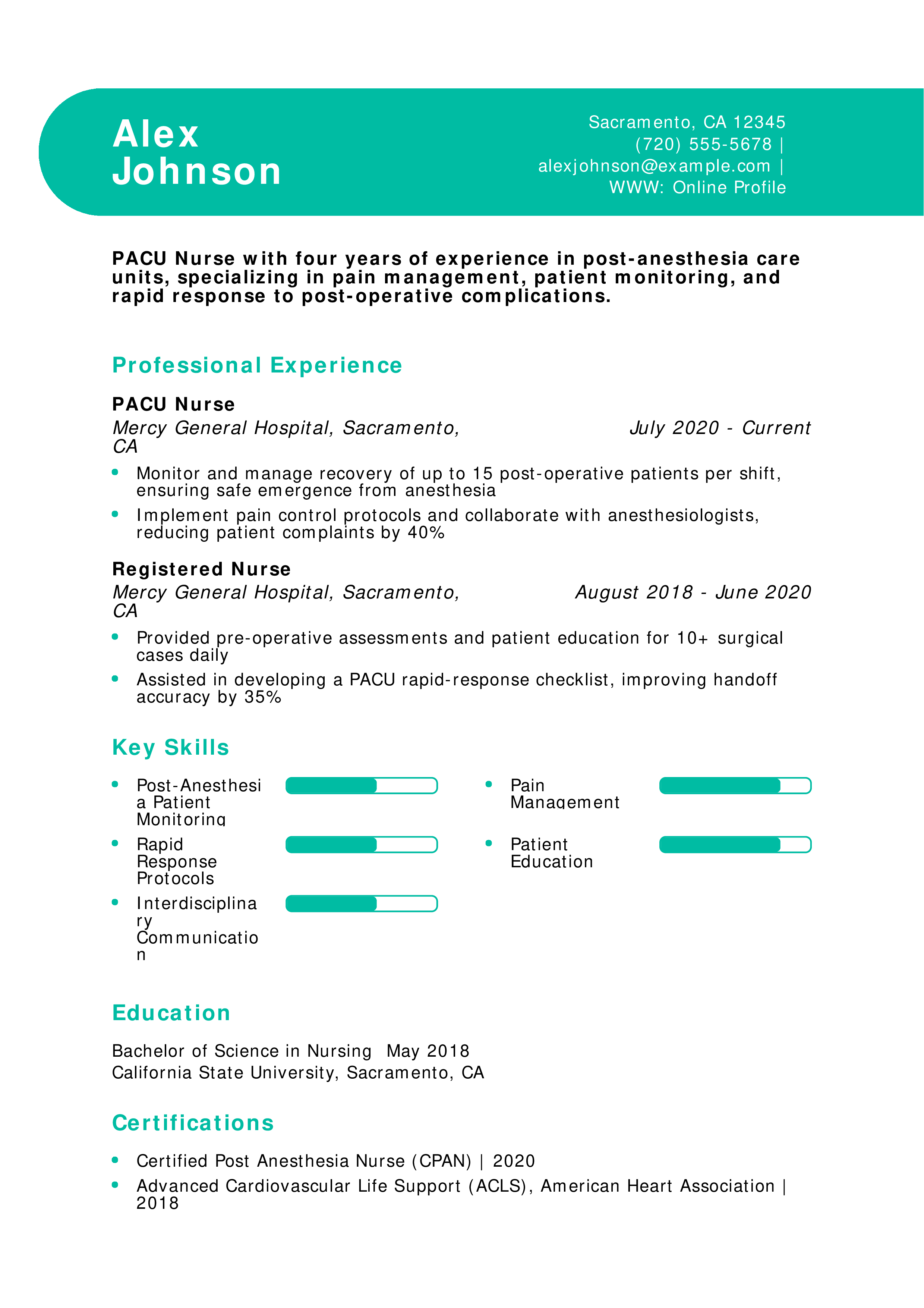
Why This Resume Is a Great Example:
Alex’s resume quantifies improvements—such as a 40% drop in patient complaints—showing effective pain management. The rapid-response checklist achievement demonstrates initiative in enhancing patient safety.
Key Tip
Use metrics to demonstrate clinical improvements and protocol enhancements. For more on highlighting specialized nursing skills, visit Technical Skills for Resume.
Aesthetic Nurse Resume
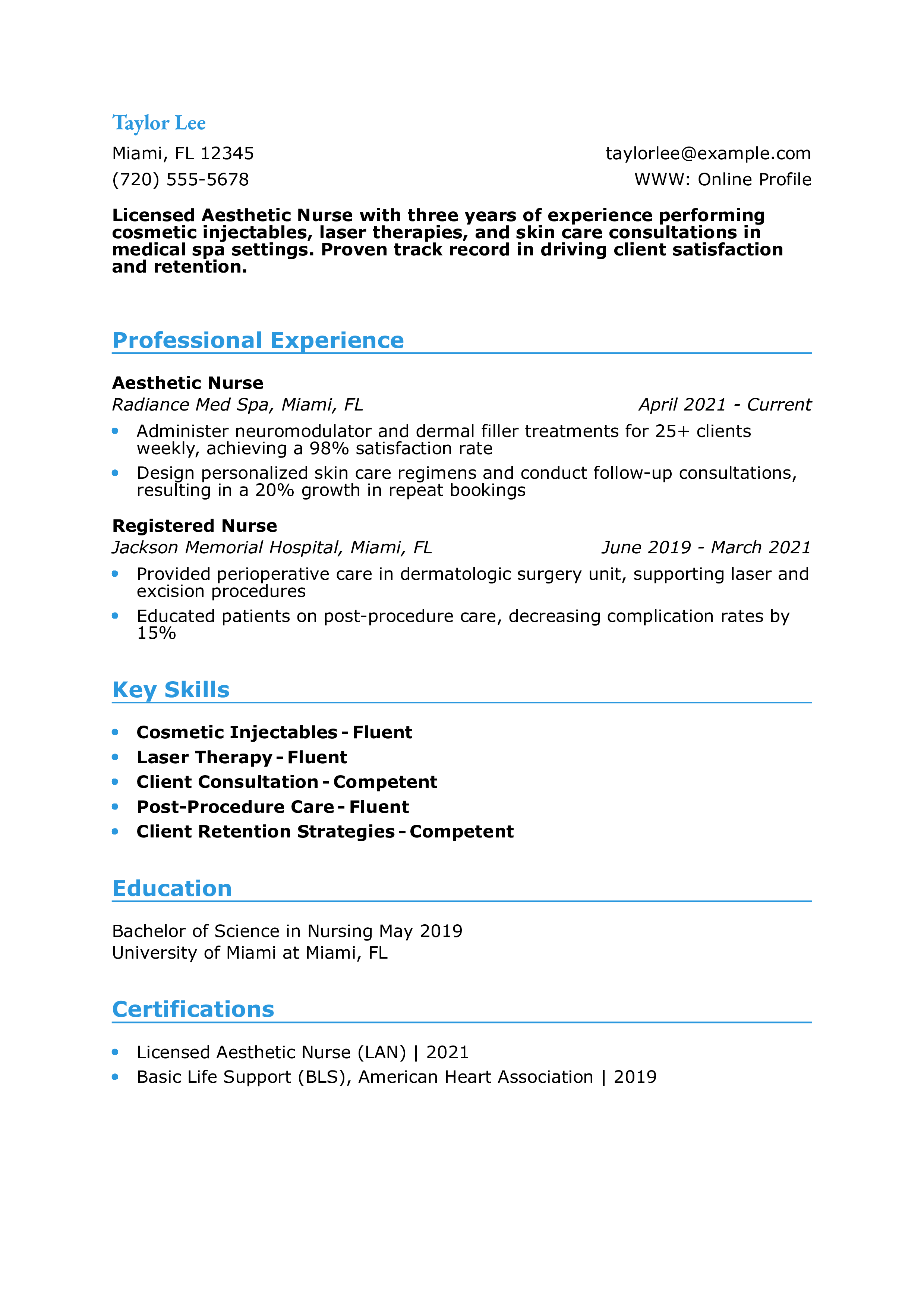
Why This Resume Is a Great Example:
Taylor’s resume emphasizes a near-perfect client satisfaction rate and a 20% increase in repeat business, showcasing both clinical skill and business impact. The reduction in complications underscores attention to safety.
Key Tip
Highlight both clinical outcomes and client retention metrics to demonstrate comprehensive expertise. For tips on presenting specialized skills, check out How to List Certifications on Resume.
Nurse Extern Resume

Why This Resume Is a Great Example:
Jordan’s externship achievements, including high competency scores and real-world documentation skills, demonstrate readiness for entry-level RN roles. The patient education initiative shows proactive engagement in safety practices.
Key Tip
Showcase simulation and externship metrics to illustrate clinical readiness and learning agility. For guidance on structuring educational experiences, see Resume Objective Examples.
Director of Nursing Resume
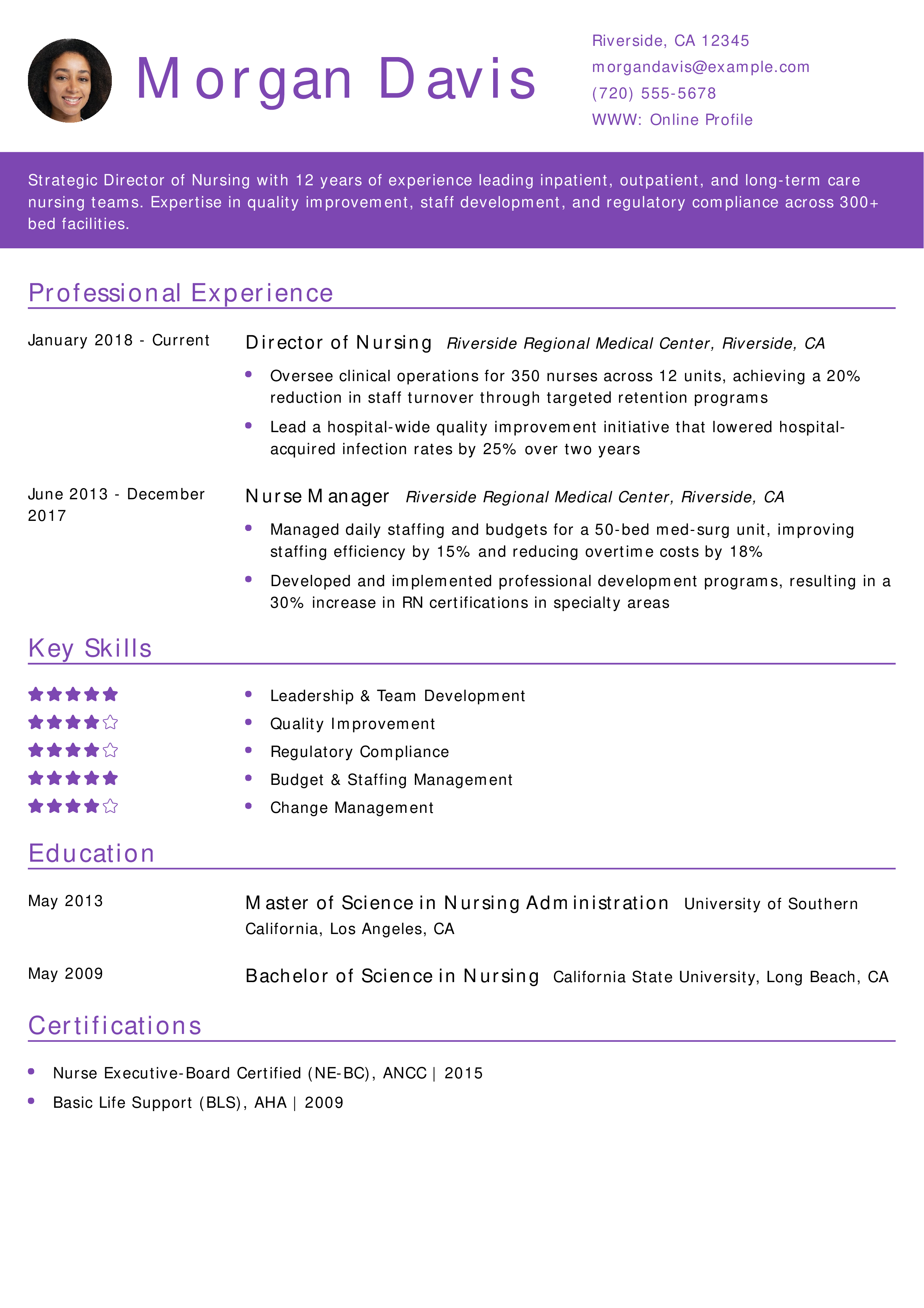
Why This Resume Is a Great Example:
Morgan’s resume demonstrates strong leadership and measurable improvements—like infection-rate reductions and turnover decreases—that underscore strategic impact. Staff development metrics showcase a commitment to professional growth.
Key Tip
Tie leadership initiatives to quantifiable outcomes to showcase your strategic impact. For guidance on framing management achievements, check out Resume Outline Examples.
Oncology Nursing Resume
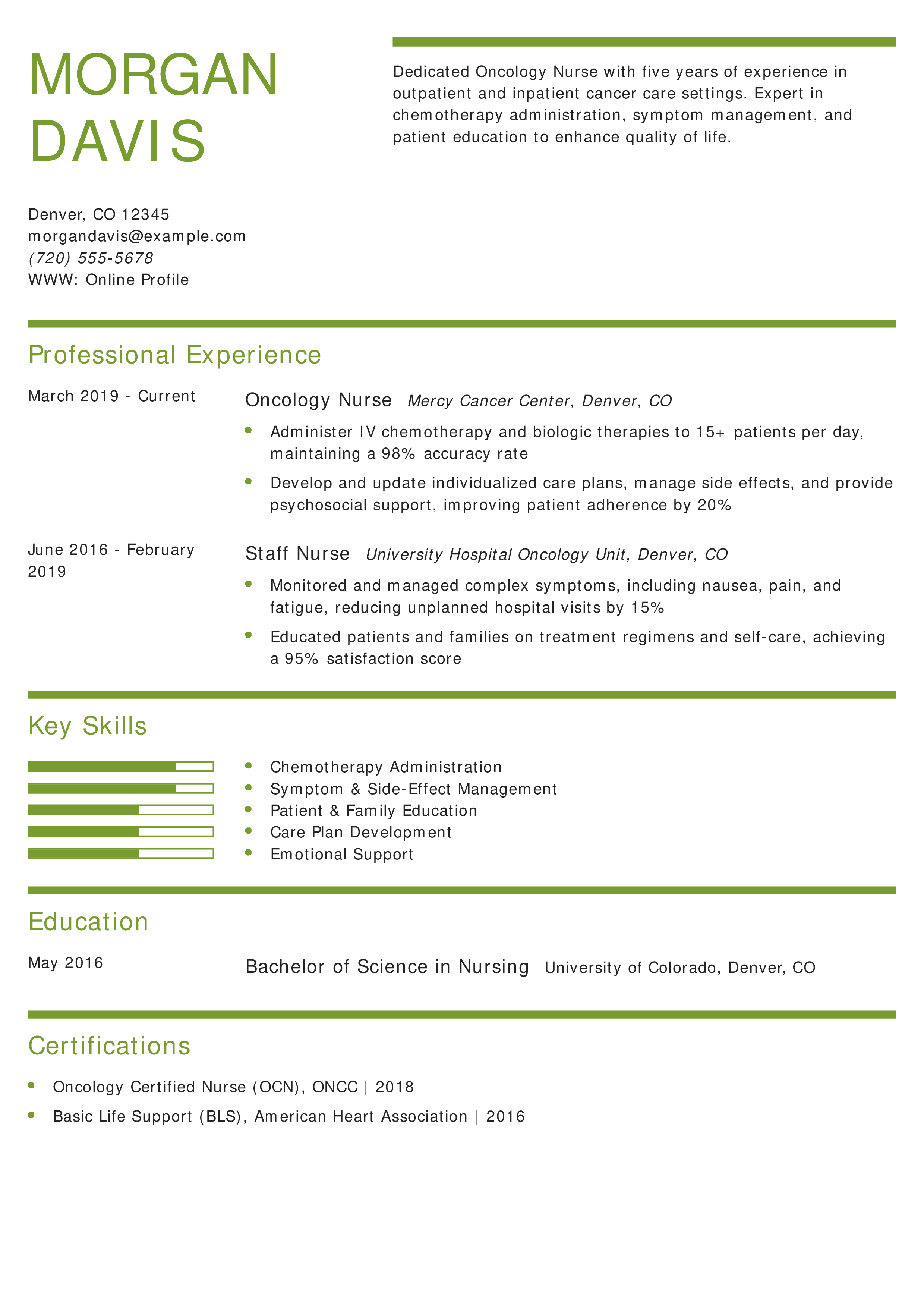
Why This Resume Is a Great Example:
Morgan’s resume highlights measurable improvements, such as a 20% boost in treatment adherence, which demonstrates clinical impact. It also emphasizes advanced oncology certifications and patient education initiatives.
Key Tip
Showcase quantifiable outcomes to illustrate your contributions to patient care. For more on presenting nursing achievements, see Best Resume Formats.
Palliative Care Nursing Resume
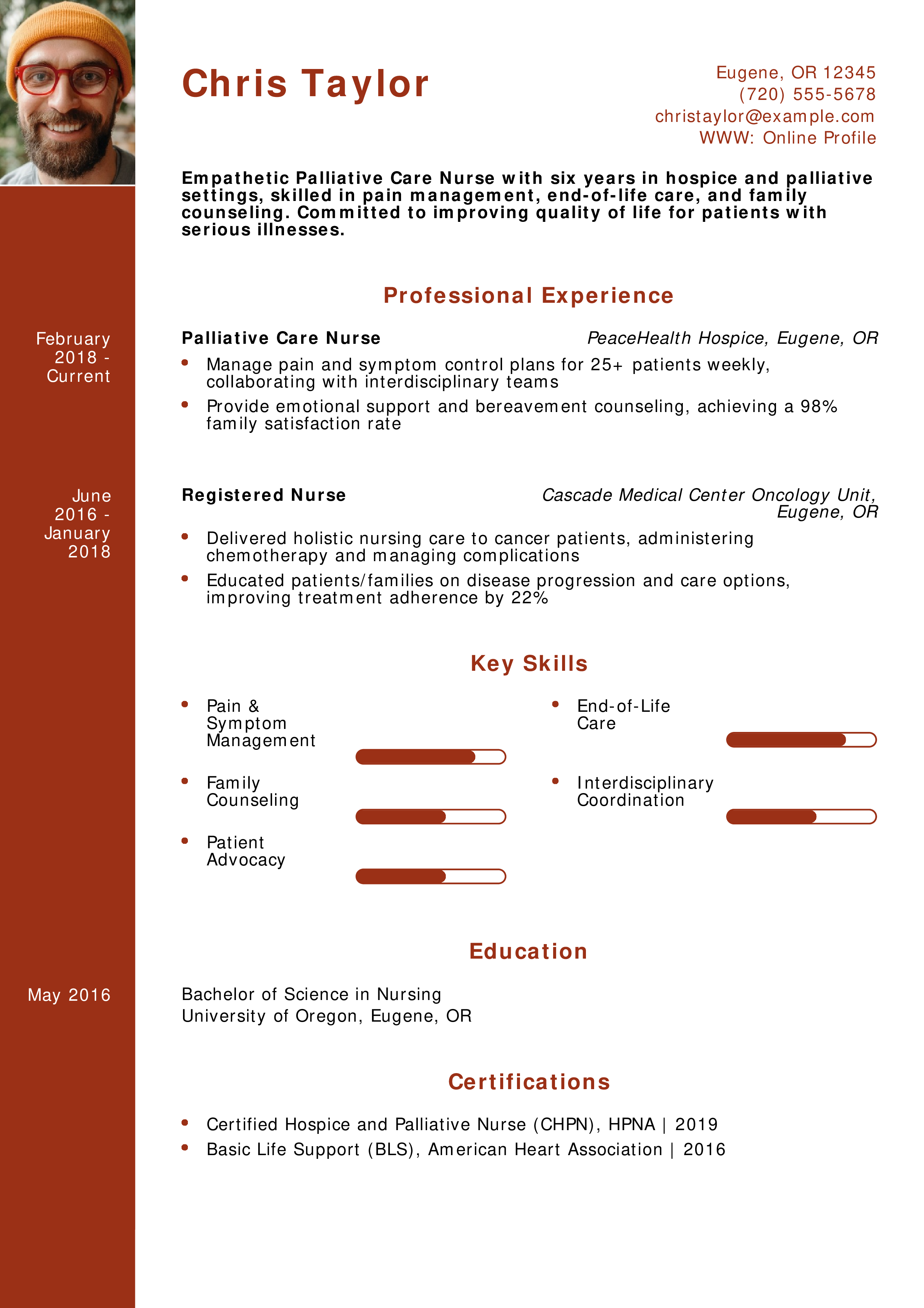
Why This Resume Is a Great Example:
Chris’s resume quantifies family satisfaction and adherence improvements, demonstrating measurable benefits of care. The dual setting experience highlights versatility.
Key Tip
Include both clinical outcomes and patient/family satisfaction metrics. For insights on advanced nursing roles, check Resume Summary Examples.
Telemetry Nursing Resume
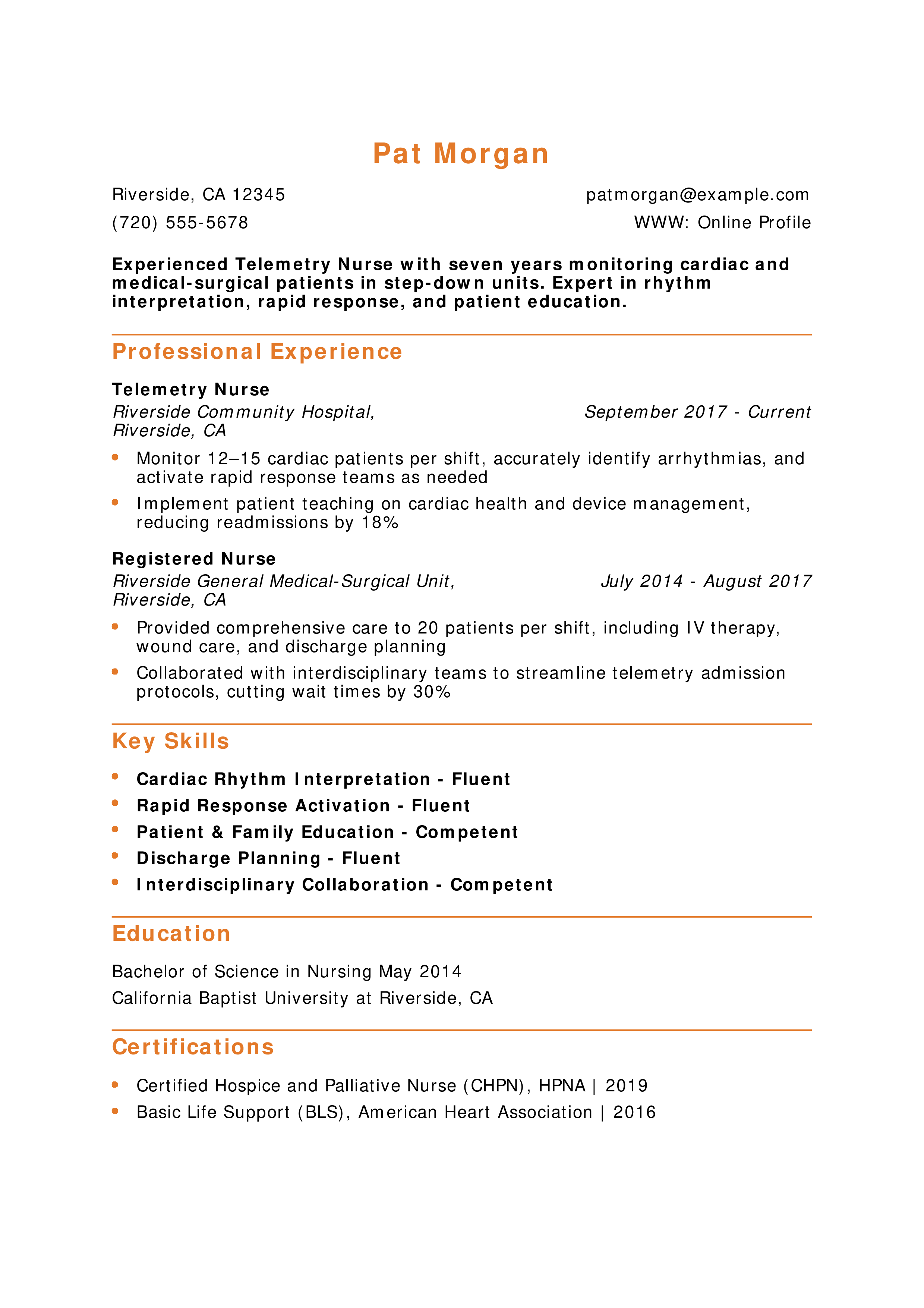
Why This Resume Is a Great Example:
Pat’s resume highlights critical rapid-response activations and an 18% reduction in readmissions, showcasing impactful telemetry interventions. The wait-time improvement underscores process excellence.
Key Tip
Demonstrate both clinical acumen and efficiency gains with concrete percentages. For more on highlighting specialized nursing skills, see Technical Skills for Resume.
Operating Room Nurse Resume
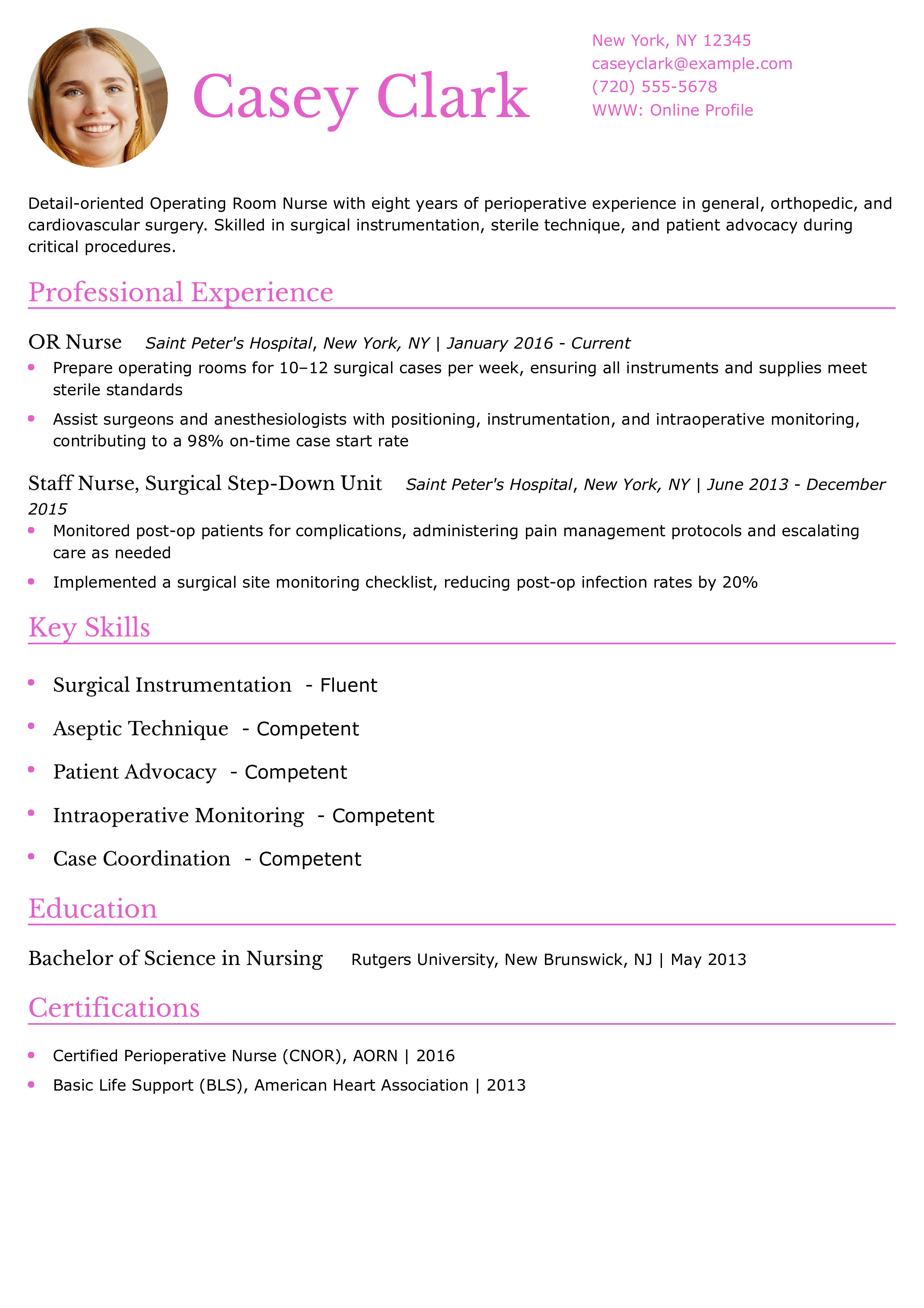
Why This Resume Is a Great Example:
Casey’s resume quantifies a 20% reduction in post-op infections and a 98% on-time start rate, showcasing both clinical excellence and operational efficiency.
Key Tip
Highlight procedural improvements and efficiency gains to stand out in OR roles. For guidance on structuring your achievements, see Best Resume Formats.
Nephrology Nurse Resume
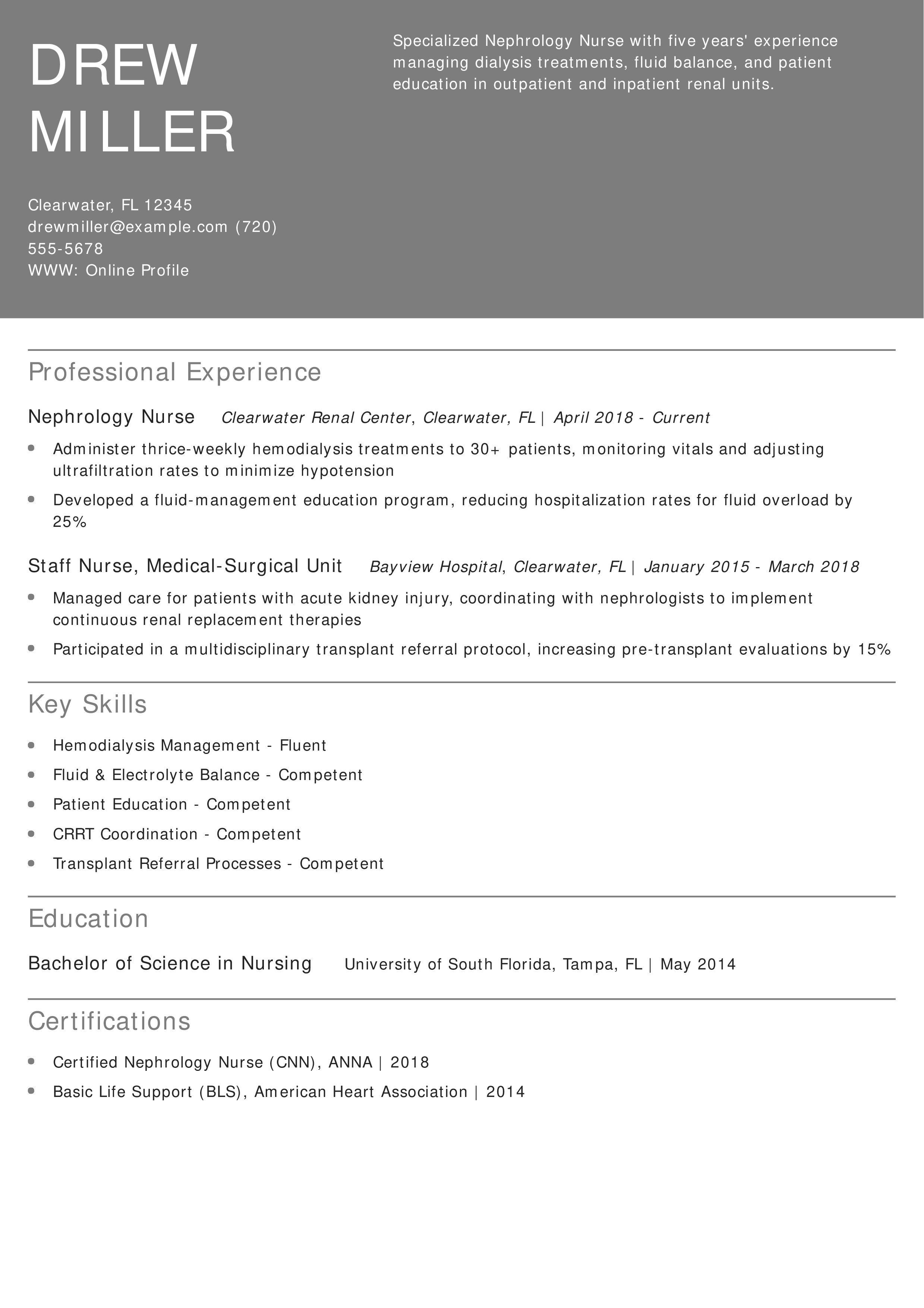
Why This Resume Is a Great Example:
Drew’s resume highlights a 25% drop in fluid-overload hospitalizations and a 15% increase in transplant referrals, demonstrating both patient-centered care and program development.
Key Tip
Use outcome metrics to showcase your specialty impact. For more on highlighting clinical outcomes, see Technical Skills for Resume.
Flight Nurse Resume
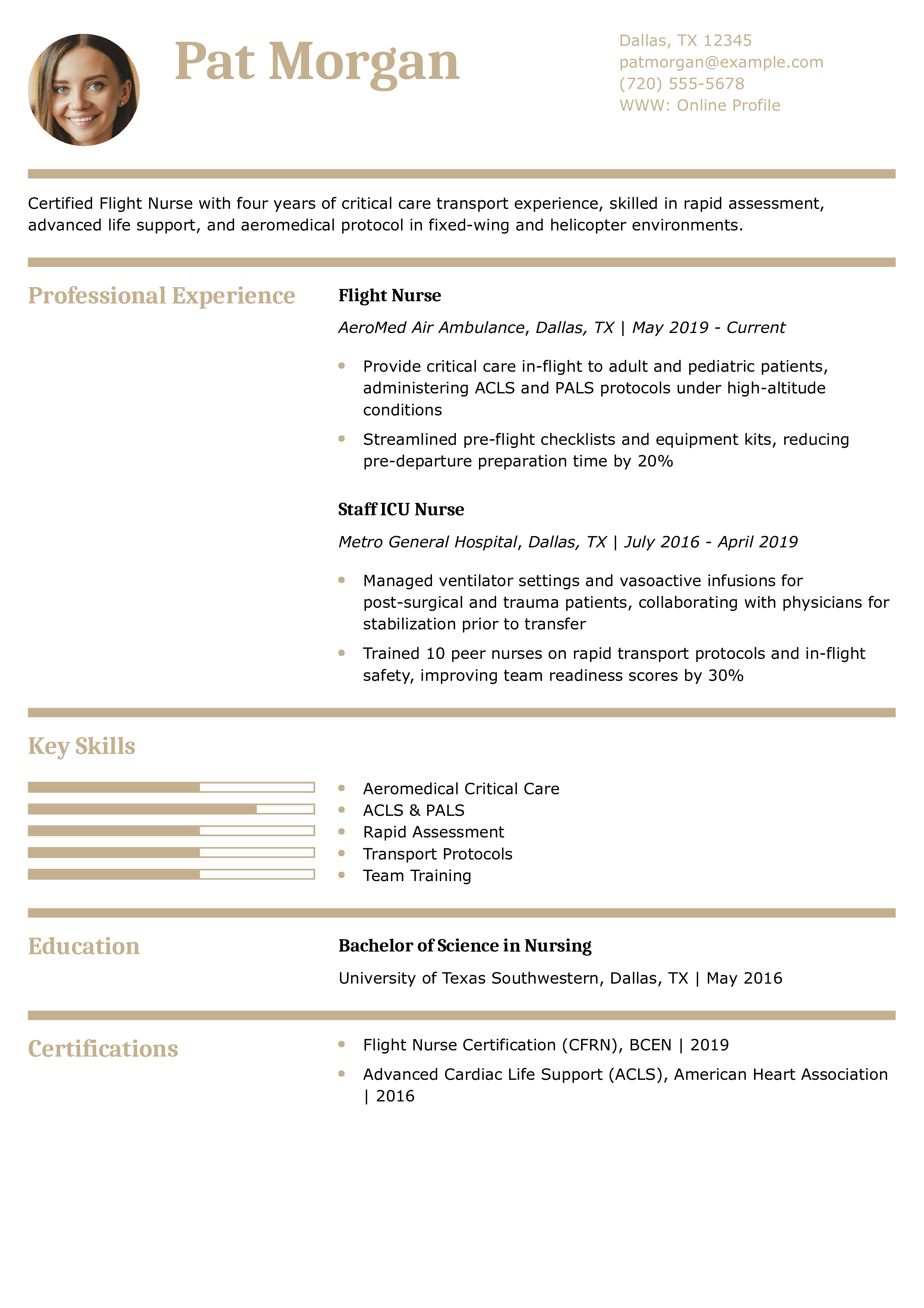
Why This Resume Is a Great Example:
Pat’s resume demonstrates a 20% improvement in prep times and a 30% boost in team readiness, underscoring both clinical agility and leadership in high-stakes transport.
Key Tip
Quantify process improvements to highlight efficiency under pressure. For more tips on showcasing rapid-response skills, see Resume Skills.
Psychiatric Nurse Resume
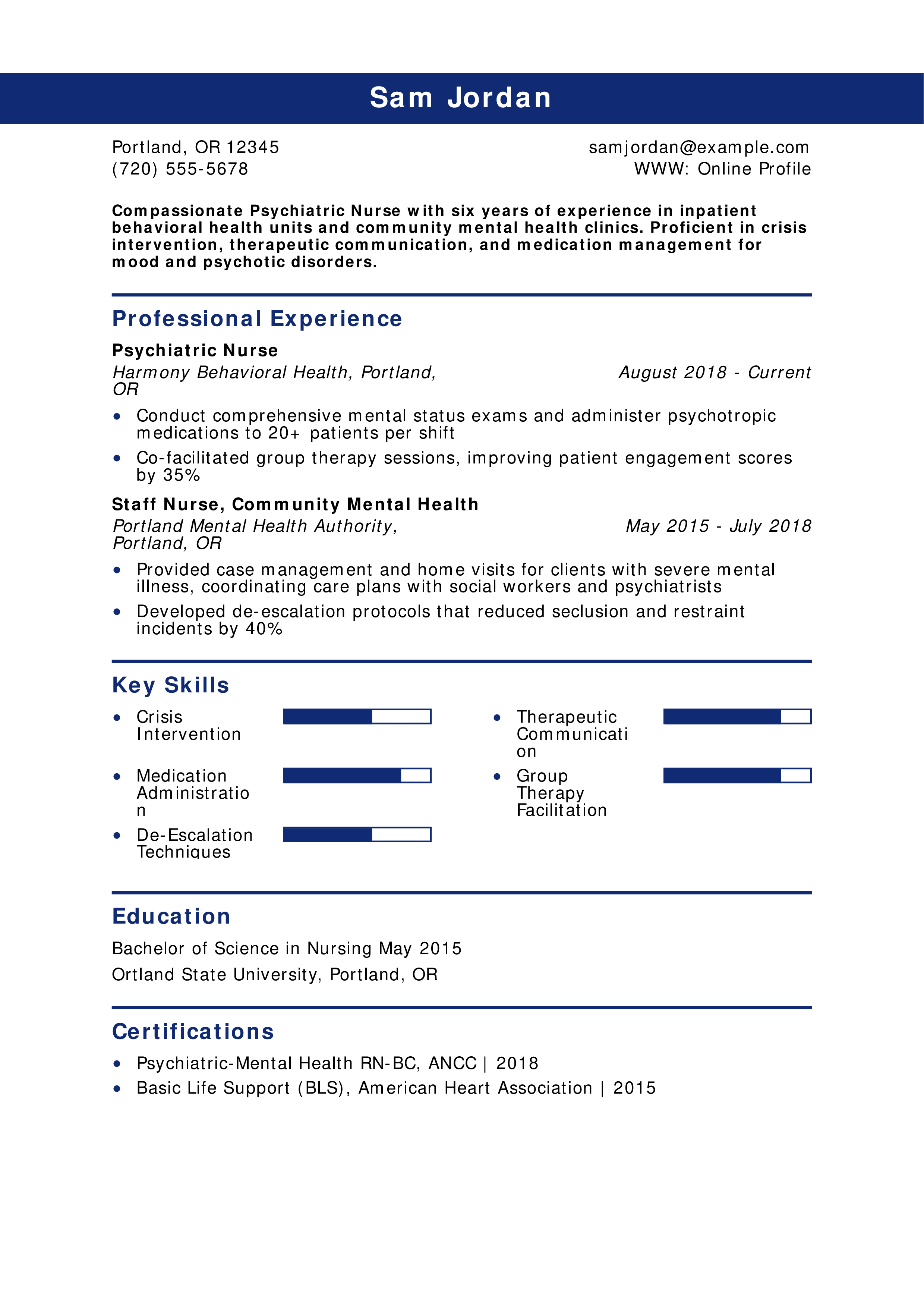
Why This Resume Is a Great Example:
Sam’s resume quantifies a 35% increase in engagement and a 40% decrease in restraint use, demonstrating both therapeutic skill and safety improvements.
Key Tip
Include mental health metrics to show effectiveness of interventions. For insight on highlighting soft skills, see Soft Skills for Resume.
Dialysis Nurse Resume
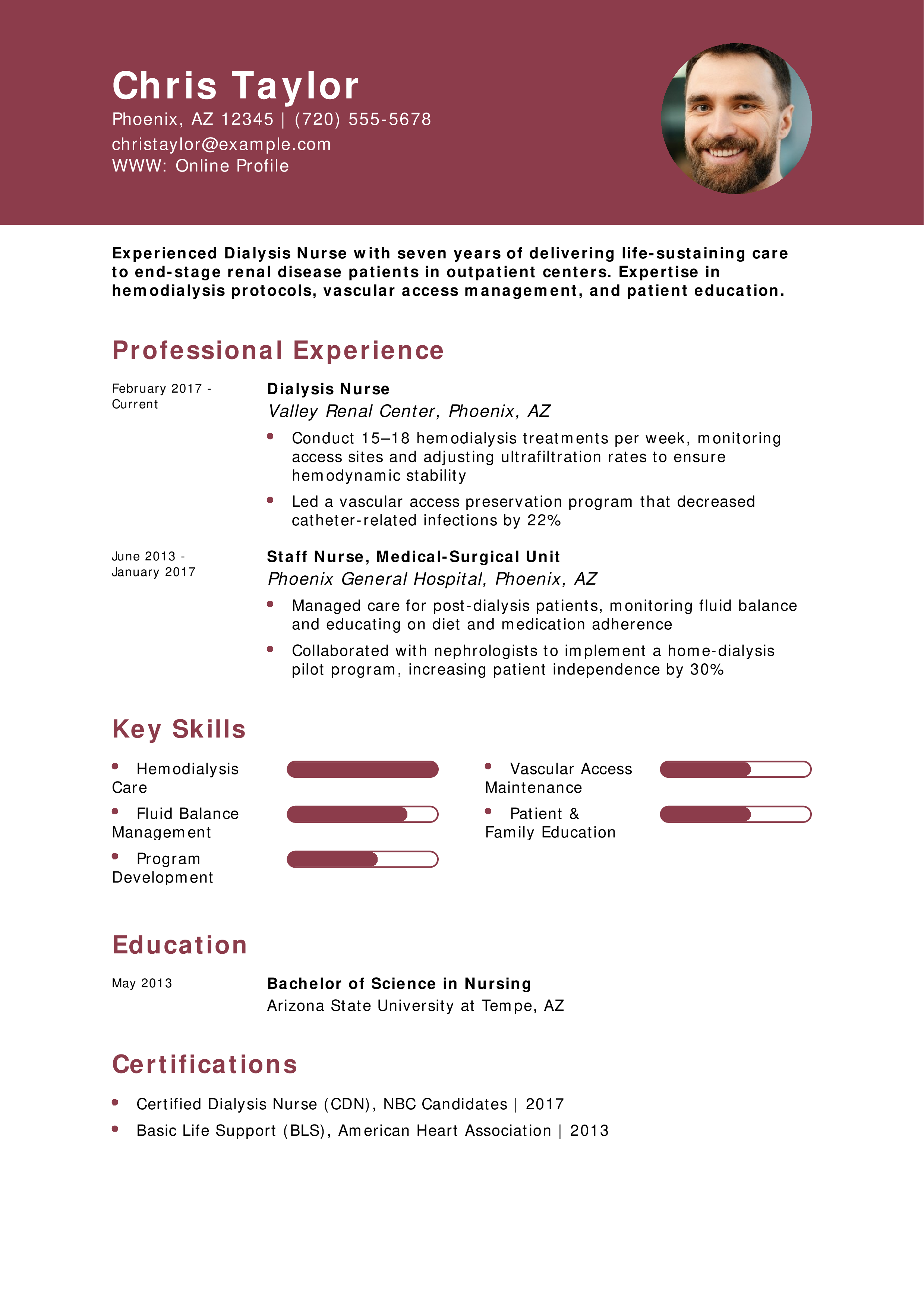
Why This Resume Is a Great Example:
Chris’s resume highlights a 22% reduction in infections and 30% boost in patient independence, showcasing both clinical quality and program innovation.
Key Tip
Emphasize infection-control and patient-independence outcomes to stand out in dialysis roles. For tips on listing certifications effectively, see How to List Certifications on Resume.
Transplant Nurse Resume
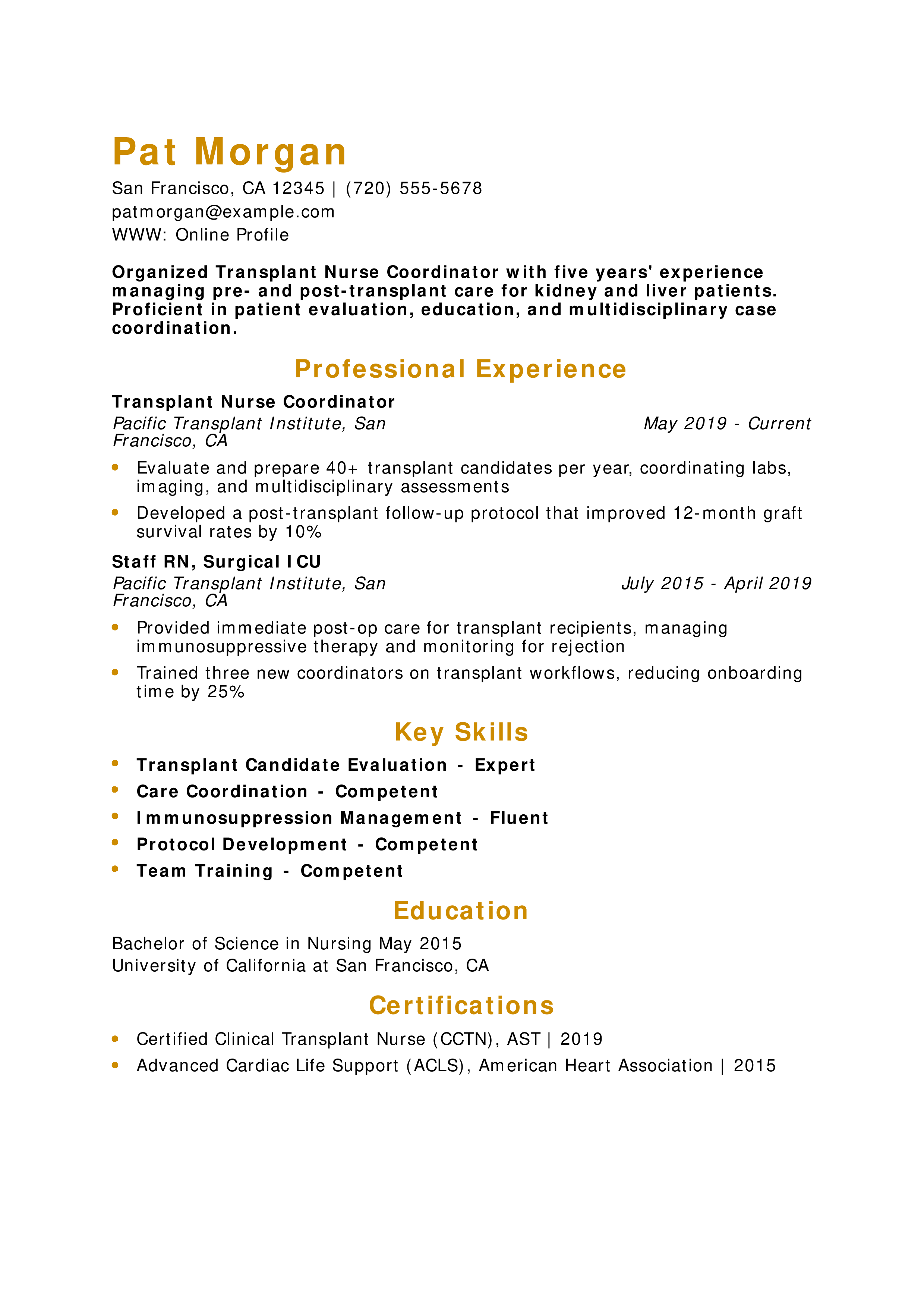
Why This Resume Is a Great Example:
Pat’s resume quantifies a 10% improvement in graft survival and a 25% faster onboarding process, demonstrating quality care and operational leadership.
Key Tip
Highlight coordination protocols and outcome improvements to showcase organizational impact. For more on structuring coordinator roles, see Resume Outline Examples.
Infusion Nurse Resume
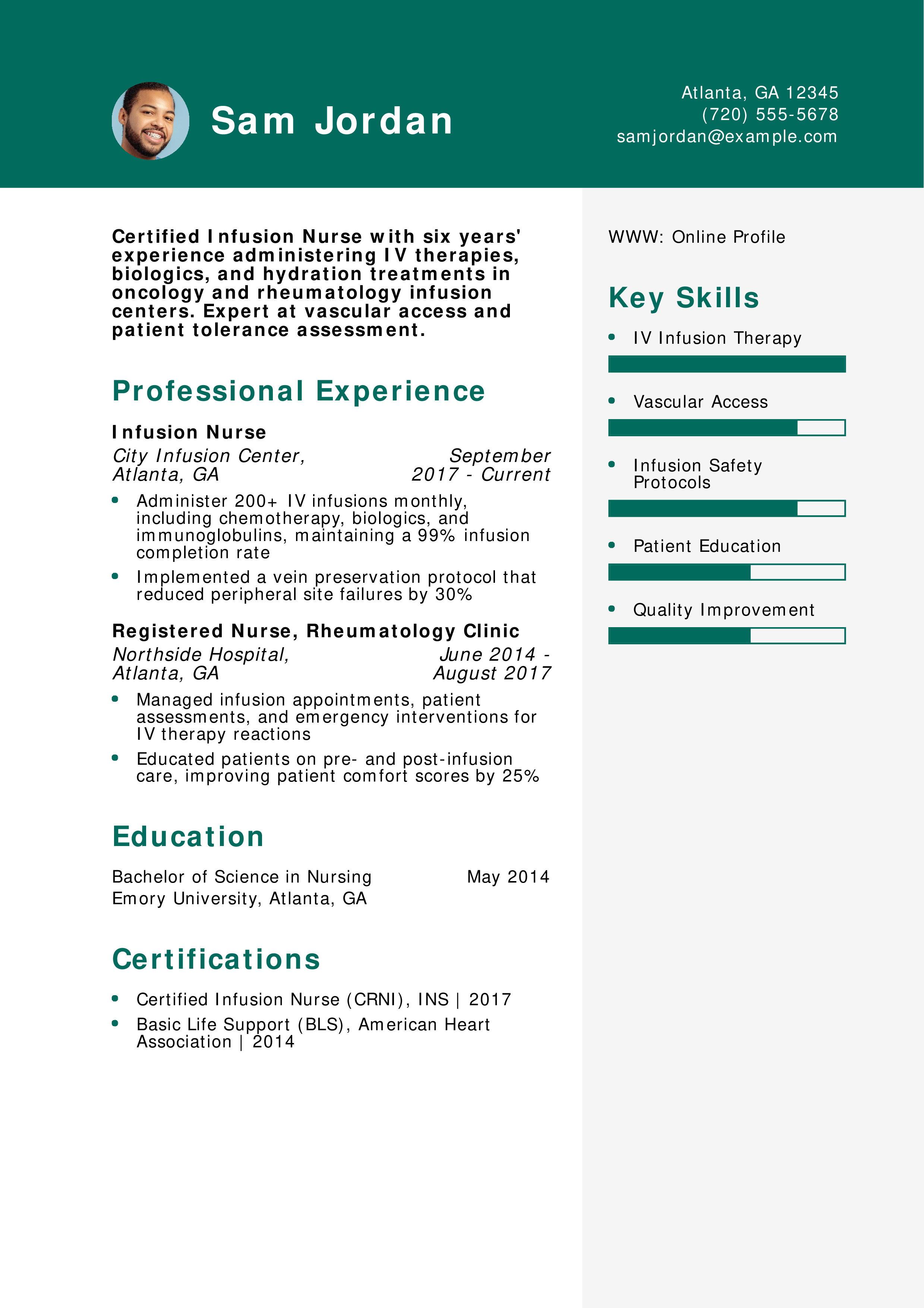
Why This Resume Is a Great Example:
Sam’s resume highlights a 30% drop in site failures and a 25% boost in comfort scores, showcasing both technical proficiency and patient satisfaction.
Key Tip
Use precise clinical metrics to underline your infusion expertise. For more on showcasing procedural skills, see Technical Skills for Resume.
Our templates are crafted by professional resume writers to make creating your resume quick, easy, and effective.
- Professional resume template downloads
- Customized cover letter generation
- AI resume writing support
- Career-building resources and advice
Nurse Text-Only Resume Templates and Examples
How To Write a Nurse Resume
1. Write a brief summary of your nurse qualifications
Your profile, also known as the summary of qualifications, is one of the most important aspects of a resume. It’s the first thing the hiring managers see when they review your document, so provide an impactful snapshot of your professional career.
One way to approach the summary is to incorporate three to four specializations related to the job you’re applying for in the first sentence, such as patient-centered care, patient education, acute care, and health care management. Leading with your specializations will show hiring managers that you have some of the key qualifications the organization seeks within seconds of reviewing your resume. Below are examples to guide you in creating your professional profile:
Senior-Level Profile Example
Profile
A registered nurse (RN) with over 10 years of experience providing high-quality, compassionate care to pediatric patients. A proven track record of collaborating with multidisciplinary teams to enhance clinical workflows and drive positive patient outcomes.
Entry-Level Profile Example
Profile
A RN with three years of experience delivering quality health care services to diverse patient populations. Adept at coordinating with nursing teams and medical personnel to drive positive patient outcomes in high-volume hospital environments.
2. Outline your nurse experience in a compelling list
The key to crafting a compelling professional experience section is to create bullet points that draw attention to your strongest career achievements within the health care sector. As you translate your experience into bullet points, establish a sense of scope for your achievements. For instance, if you worked in a high-volume hospital, display the nurse-to-patient ratio or the number of beds. These details will help hiring managers better understand how your background can benefit their team and organization.
Senior-Level Professional Experience Example
- Communicated empathetically with diverse patients, built rapport, and drove the delivery of patient-centered care to achieve a 94% patient satisfaction rating
- Supported an interdisciplinary team with direct nursing care for patients and assisted with developing care plans to improve patient outcomes
- Led, mentor, and coached a team of more than 15 LPNs and identified opportunities to enhance clinical workflows, resulting in a 10% reduction in average wait times
Entry-Level Professional Experience Example
- Completed a 150-hour practicum in the surgical ICU under the supervision of an RN and ensured compliance with hospital protocols
- Prepared surgical tools and operating theaters, replenished medical inventory and equipment, and ensured compliance with sanitation and hygiene regulations
- Oversaw the preparation of over 12 patients for surgery per day and supported post-surgical care before transfer to the recovery unit
3. Add nurse education and certifications
Along with your education and nursing licensure, consider including any additional certifications or training courses you completed throughout your nursing career. This information is essential if you plan on pursuing a position in a specialized unit, such as oncology or pediatrics. Obtaining additional certifications will also show hiring managers your array of knowledge of various areas of health care, which may differentiate you from the competition.
Education
Template
- [Degree Name]
- [School Name], [City, State Abbreviation] [Dates Enrolled]
Example
- Bachelor of Science (B.S.) Nursing
- College of Notre Dame, Baltimore, MD, September 2014 – June 2018
Certifications
Template
- [Certification Name], [Awarding Organization], [Completion Year]
Example
- Registered Nurse, State of Maryland, License #12345, 2010
- Advanced Cardiac Life Support Certified, American Heart Association, 2010
4. Make a list of your nurse-related skills and proficiencies
Applying to jobs doesn’t just mean impressing the hiring manager. It means getting past the applicant tracking systems (ATS). An ATS automatically sorts resumes into categories and highlights candidates with the right keywords, instantly identifying the best matches for each job posting. The more keywords you use in your resume, the more likely you can make it to the hiring manager’s desk and land an interview. Here are some of the phrases you might use to demonstrate your skills as a nursing applicant:
| Key Skills and Proficiencies | |
|---|---|
| Activities of Daily Living (ADLs) | Acute care |
| Case management | EKGs |
| Electronic Health Records (EHR) | HIPAA |
| Medication administration | Oncology |
| Orthopedics | Patient-centered care |
| Patient discharge | Patient intake |
| Patient relations | Pediatric care |
| Post-operative (post-op) care | Surgical care |
| Telemetry | Treatment planning |
| Physical examinations | Pre-operative (pre-op) care |
| Trauma care | Triage |
| Wound care | |
How To Pick the Best Nurse Resume Template
As a nursing professional, you must select a well-organized and straightforward template. If your template has bulky graphics or distracting colors, you may draw the hiring manager’s eye away from your accomplishments. When in doubt, choose a well-structured template that keeps the reader’s focus on why you’re qualified for the position rather than only on visual appeal.
Frequently Asked Questions: Nurse Resume Examples and Advice
How can I customize my Nurse CV for a specific job role?-
Customizing your Nurse CV involves closely analyzing the job description and ensuring that you include the relevant skills and accomplishments that align with the employer’s needs. Use specific keywords from the job posting, and focus on tailoring your profile summary and professional experience sections to match the responsibilities of the position you're applying for.
What are common action verbs for nurse resumes?-
It’s easy to run short on action verbs during the resume-building process. Often a limited number of verbs accurately convey your work experience and career achievements, especially as a health care professional. Incorporating a mix of action verbs can enhance the impact of your bullet points and improve the reading experience. To keep your content fresh and engaging, we’ve compiled a list of action verbs to craft your nurse resume:
| Action Verbs | |
|---|---|
| Administered | Analyzed |
| Collaborated | Communicated |
| Conducted | Coordinated |
| Delivered | Diagnosed |
| Enhanced | Identified |
| Implemented | Improved |
| Interfaced | Led |
| Managed | Oversaw |
| Performed | Provided |
| Resolved | Supported |
| Treated | |
How do you align your resume with a job posting?-
Although nursing positions are expected to increase by 6% over the next decade, according to the Bureau of Labor Statistics, you’ll still need to tailor your resume to the job description to maximize your chances of landing the interview. One of the most important aspects of creating a strong nurse resume is highlighting the nuances of your experiences within the health care industry.
For instance, if you’re applying to an organization with a strong reputation for patient-centered care standards, you may want to include insights showcasing your patient advocacy history. If you’re pursuing a position in an oncology unit, you might emphasize your background in interfacing with cancer patients or supporting physicians during surgeries. Tailoring your resume to individual job postings is the best way to differentiate yourself from the competition during the job search process.
What is the best nurse resume format?-
Always use a reverse chronological format when crafting your nurse resume. This will ensure that your most recent achievements are featured at the top of your document. It’s best to avoid using a functional resume format in most instances, as this approach highlights skill sets without providing context or specific accomplishments for the hiring manager.
What’s the ideal length for a nurse resume?-
A one-page resume is ideal for most nurse positions, especially if you have less than 10 years of experience. For experienced professionals, a two-page resume may be appropriate, but only if it includes valuable, job-relevant content. Focus on showcasing your key achievements, certifications, and skills that align with the job description.
Aim to include work experience from the last 10 to 15 years. Older roles can be summarized or omitted unless they add significant value. Keeping your resume concise and relevant will leave a strong impression on hiring managers.

Although not every job posting will require a cover letter, many organizations still ask for them during the hiring process. To maximize the impact of your cover letter, mention something unique about the hospital’s reputation or work culture. Including this information will show hiring managers that you’ve researched beforehand and are genuinely interested in the position. For more guidance, you can visit our nurse cover letter guide.
Craft your perfect resume in minutes
Get 2x more interviews with Resume Builder. Access Pro Plan features for a limited time!




